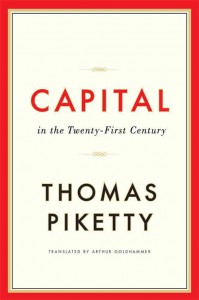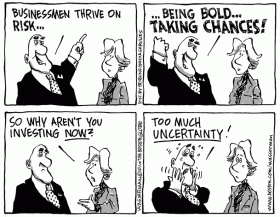
Nobody knows exactly where we are going, and nobody knows what the journey will be like – the only thing certain is that unless we move to create a Sustainable existence on this planet, we are screwed…!
The extent of our stupidity when it comes to Sustainably living on our planet is almost impossible to comprehend and in the same way solutions will require changes, so far-reaching that we probably haven’t realized more than a fraction of it yet.
 Probably no one has described it better than Naomi Klein in her latest (2014) book “This Changes Everything“.
Probably no one has described it better than Naomi Klein in her latest (2014) book “This Changes Everything“.
But – We must not let the magnitude of the challenge paralyze us, we need to keep up the momentum, or as Winston Churchill once said:
Never, Never, Never give up!
…and changes are happening – definitely not to the extent necessary and not at the speed the urgency requires, but nevertheless, some positive trends are “surfacing”…
Let’s take a look at some of them.
Divestment
 In a very short time the Fossil fuel divestment-movement launched by 350.org and Bill McKibben only a few years ago, have reached “global” proportions – today most people are aware of its existence, and lot’s of people and organizations are supporting, promoting and doing it – divesting from Fossil fuels!
In a very short time the Fossil fuel divestment-movement launched by 350.org and Bill McKibben only a few years ago, have reached “global” proportions – today most people are aware of its existence, and lot’s of people and organizations are supporting, promoting and doing it – divesting from Fossil fuels!
- Pope Francis Climate Encyclical, June 18th, 2015
(Also Dalai Lama, Ali Gomaa, former Grand Mufti, Islam, statements from 360 Jewish Rabbis and a declaration from the Hindu spiritual leaders convention, express great concern and support in moving
away from fossil fuels.) - Ban Ki-moon, UN chief
- Union of Concerned Scientists
- Church of England
- Oxford University
- Lund University, Sweden
- Several other Campuses all over the world
- Guardian Media Group
- Pension Funds in many countries
- Norway’s $890-billion sovereign-wealth pension fund (the world’s largest.)
- Stanford University
- French Insurer AXA SA
- Rockefeller Brothers Fund
- and many, many more…LINK
This list shows only some of the most recent organisations divesting from Fossil fuels.
Although the number of dollars being divested away from coal and other fossil fuels are still not that big, the signal it sends is Powerful. Financial institutions are today seriously considering the overwhelming risk of being stuck with huge amounts of stranded assets once the consequences of the “daunting” reality – that we in order to be anywhere close to the critical 2 ºC climate target need to keep at least 80% of the known fossil fuels in the ground – have settled.
The market cap of the coal industry and especially mining have in only a couple of years literally “plunged”, losing up to 60% of its collective worth…
What about YOU – are You investing your money in an industry prone to “Burn our planet”?
Let the polluters pay…
The Polluter pays principle or “Extended Producer Responsibility” (EPR) is a pretty straight-forward approach, being responsible for your actions isn’t that difficult to comprehend, and still…
According to a recent article in the Guardian, based on a study from IMF, the Fossil fuel companies are benefitting from global subsidies of $5.3trillion (£3.4tn) a year, equivalent to $10million a minute every day.
$ 10,000,000 / minute
The vast sum is largely due to polluters not paying the costs imposed on governments by the burning of coal, oil and gas as well as direct subsidies.
This are subsidies granted to one of the most lucrative industries on the planet, an industry also actively pursuing elaborate tax-evasion schemes and lobbying against any attempts to impose the polluter pay principle…
At the same time the subsidies to renewable energy is approx. $ 3,800 / minute (2%)
The inequality and the fact that normal taxpayers together with governments not only will suffer the consequences from unabated CO2-emissions – they should also pay the companies to continue the excess, while quietly observing an industry avoiding its responsibility and reaping huge profits…
The momentum in public opinion on this matter is building rapidly worldwide – destroying our planet to gain economic profits is becoming less and less accepted.
Inequality
…the 85 wealthiest persons have more wealth than the 3.5 billion poorest…
There is a more and more “visible” discussion on the enormous inequality in our society and the many negative effect this brings.
Finally the era of neo-classic macroeconomics with its delusory ideas of a “Free market” as the “solution to everything”, seems to be caught up by reality.
Read more in a previous article – “A free market – Free at “ANY” price…?”
 Modern economists like Thomas Piketty and more “common-sense” politicians like Elisabeth Warren are finally gaining publicity, increasing the debate on what our Society really should be about.
Modern economists like Thomas Piketty and more “common-sense” politicians like Elisabeth Warren are finally gaining publicity, increasing the debate on what our Society really should be about.
With a world filled with exploitation of people and resources, with conflicts, natural disasters, huge numbers of refugees and a threatening Climate change – it is imperative that we re-define what a “Good life” should be about, and simultaneously get rid of some of the rogue behavior the last decades of unabated capitalistic and egoistic focus have resulted in.
Broken Boundaries
Almost every day on the news there is a feature on some Planetary or Societal boundary being broken – it is about mega-draughts surpassing all previous records, enormous flooding, mass-extinction of bees caused by pesticides, depleted fish stocks, glaciers vanishing at an unprecedented rate, immense numbers of climate-refugees and so on…
 The signs of “fatigue” are now becoming so obvious that they easily outperform even the most detailed and advanced scientific simulations executed by the IPCC and others.
The signs of “fatigue” are now becoming so obvious that they easily outperform even the most detailed and advanced scientific simulations executed by the IPCC and others.
Climate change is no longer some event in a distant future, nor is it happening somewhere else, it is happening here and now!
This is of course not something that qualifies as “a positive trend”, but the consequence is.
We are now talking about REAL things happening, highlighting the urgency to act.
More and more we also understand and acknowledge the interconnectivity and interdependence between “everything” on this fantastic planet – people begin to “connect-the-dots”.
Look out for “The Laggards”…
It is amazing, the way some people and companies argue “Yes, we are going for sustainability… but only after we have done this and that..!”
Then they keep on with “Business-as-usual” continuously running into new issues that have to be solved “First”, or self-imposed economic targets that must be accomplished “First” – convinced that “nothing is as important as solving the currently most urgent issue at hand” – but then maybe…
 Look out for these one’s – people and companies with such “self-centered” behavior is not the type of partner you’d be looking for when building your Sustainable supply-chain.
Look out for these one’s – people and companies with such “self-centered” behavior is not the type of partner you’d be looking for when building your Sustainable supply-chain.
What is a bit scary, is that there are so many companies out there lacking visionary leaders, instead being managed by people strongly believing that a rear-view mirror is the most valuable “leadership-asset” or by “structure-maniacs” believing that if you only keep on carrying out a pre-set workflow or other intricate system in every detail, eventually it will be successful…
I am not sure, but sometimes I get a bad premonition when I hear some of these “laggard-companies” talking about their Quality- and ISO-certified systems – not that I think these schemes are bad, but many companies become zealous clause-riders, quite often also quoting William Edwards Demings statement that; “You can’t manage what you can’t measure.” – as some kind of “mantra” convinced it will automatically bring success…
(In fact, Deming stated that; “one of the seven deadly diseases of management is running a company on visible figures alone.”)
Structures and systems are often result from comprehensive efforts of documentation and systematization to reflect “how we do things when we are at our best” – once launched these systems tend to become “Perpetuum mobile:s” with managers focusing on incremental changes to fine-tune their “already excellent” set-up.
Also see a previous article “Our Social “Perpetuum mobile…”“.
Most systems include some kind of function “to assess whether the systems functionality fulfill the needs of the organization”, often to be scrutinized and decided by top management.
…What level of “dysfunctionality” is required for management to decide on a complete re-make or a thorough re-structure of a complicated and often quite detailed (and expensive) system…?
…The only reason these companies are going to change is if there is a legal requirement or maybe if their normal business-model all of a sudden is failing (if they are lucky or able to detect it, in time) – very little innovation going on here…
The journey of a thousand miles
begins with one stepLao Tzu